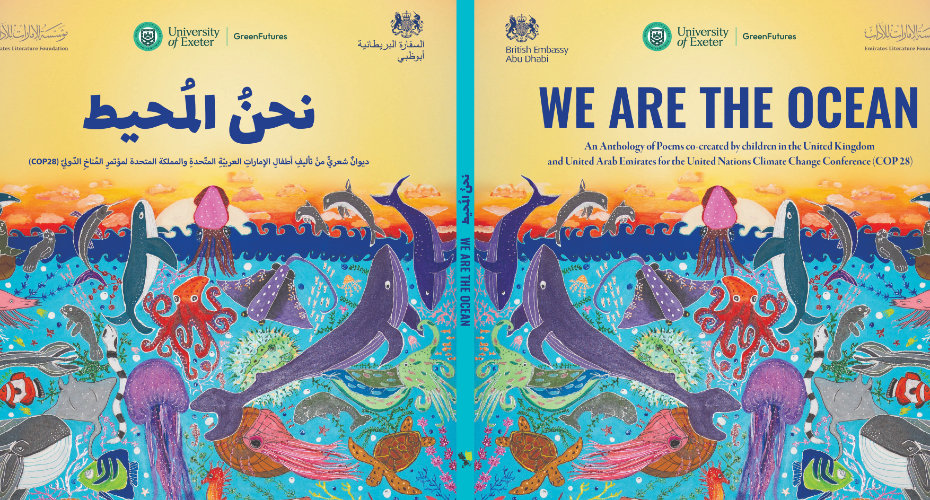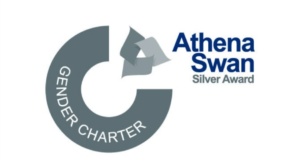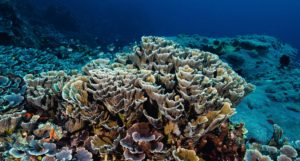Schoolchildren in the UK and United Arab Emirates issue poetic rallying cry for the world’s ocean at COP28

Schoolchildren in the British Isles and the United Arab Emirates are using poetry and art to make a direct appeal to policymakers and world leaders at the UN’s COP28 climate change conference about the plight of the world’s ocean.
Around 400 pupils aged 10-12 have co-created an illustrated British-Arabic poetry anthology, entitled We Are The Ocean, which expresses their hopes, fears, and actions for the planet’s blue environments.
The anthology, featuring 12 poems and striking artwork of marine life, has been developed as part of a collaborative educational initiative called ‘Schools Across the Ocean’, which has twinned 14 coastal schools in the British Isles and the UAE and enabled them to learn together online.
We Are The Ocean will be formally launched on Ocean Day at COP28 (9th December) at the Greening Education Hub by representatives of the project team, led by the University of Exeter and their partner the Emirates Literature Foundation, together with the UAE’s Ministry of Education and the British Embassy in UAE.
“We Are The Ocean is a powerful plea by the children to take better care of our blue environments,” says Dr Sally Flint, Creative Lead of We Are The Possible, the international UK-UAE collaboration that has orchestrated the work. “They are the inheritors of this planet, and through education, science and art, they have connected with the ocean and their fellow children to create a lasting legacy – one that we hope will resonate with world leaders.
‘Without the children’s words, images, questions, discoveries, concerns, conversations and evolving love of the ocean this bilingual anthology wouldn’t have happened.”
During the autumn term, the schools taking part in the project – drawn from the Channel Islands, Cornwall, Devon, and Dorset in the UK, and from Dubai, Sharjah, Fujairah, and Abu Dhabi in the UAE – connected with their twinned partner via the online Padlet platform, sharing work, learning about one another’s locations, and taking part in joint activities.
Guided by a Schools Across the Ocean Teachers’ Toolkit, developed by education experts at Exeter, teachers were able to follow a weekly programme of learning activities, such as exploring the importance of seagrass ecosystems, with support from marine science experts at the University of Khorfakkan.
Through a series of workshops designed by Dr Flint, the children were encouraged to write and draw intuitively, using facts and feelings. Then, with renowned children’s author, Professor Wendy O’Shea-Meddour (also University of Exeter), and UAE-based writer Sarah Abdullah, they collated their creative outputs and wove them into 12 poems in English and Arabic.
Her Excellency Razan Khalifa Al Mubarak, President of the International Union for Conservation of Nature and UN Climate High Level Champion for COP28, and Edward Hobart CMG, His Majesty’s Ambassador to the United Arab Emirates, have provided forewords, and a film capturing the experiences, voices, and actions of the children has also been developed and is being screened at COP. Renowned British artist Kurt Jackson has also supported the project and has enabled the children to study some of his paintings.
“Schools Across the Ocean is about connecting children in a common endeavour and helping them to develop resilience and empathy in relation to climate change,” says Anita Wood, education lead in Exeter’s School of Education. “At a time when so many countries still do not have climate change as part of their national curriculum, this is a powerful example of how education can provide young people with that vital sense of agency that they can do something about the environmental challenges we face.”
One of the schools that took part in the project was St Just Primary.
“The Schools Across the Ocean project has genuinely transformed what we do at St Just Primary,” said Demelza Bolton, Head Teacher of the school in West Cornwall. “The children have been working on sustainability projects together and really thinking about other places around the world and our oceans. They feel their voices can be heard and that they can make a change and they are important, and it is going to have a significant impact on their lives now and in the future. We might be the most westerly school in the UK, but we will by the end of this project be the most connected.”
Isobel Abulhoul OBE, Founder, Advisor and Trustee of the Emirates Literature Foundation, added: “As a Foundation, we understand that it is difficult for young people to be growing up in times of uncertainty, particularly related to the climate, and how important it is for them to have a channel for their concerns. This project has worked towards providing a wonderful artistic outlet, through poetic expression, to children’s voices – validating the students’ concerns as relevant, urgent, meaningful, and giving a platform to the future generation.”
We Are The Possible brings together a host of organisations including the British Embassy, the Met Office, the Theatre of Others, BIMM Institute and the British Council.



